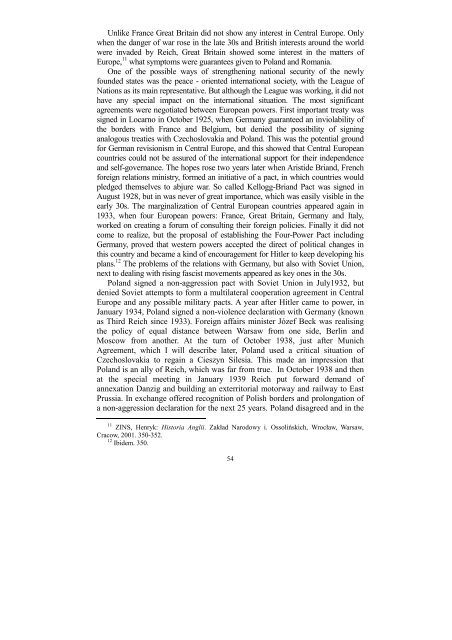The Molotov-Ribbentrop Pact - ELTE BTK Történelem Szakos Portál
The Molotov-Ribbentrop Pact - ELTE BTK Történelem Szakos Portál
The Molotov-Ribbentrop Pact - ELTE BTK Történelem Szakos Portál
You also want an ePaper? Increase the reach of your titles
YUMPU automatically turns print PDFs into web optimized ePapers that Google loves.
Unlike France Great Britain did not show any interest in Central Europe. Only<br />
when the danger of war rose in the late 30s and British interests around the world<br />
were invaded by Reich, Great Britain showed some interest in the matters of<br />
Europe, 11 what symptoms were guarantees given to Poland and Romania.<br />
One of the possible ways of strengthening national security of the newly<br />
founded states was the peace - oriented international society, with the League of<br />
Nations as its main representative. But although the League was working, it did not<br />
have any special impact on the international situation. <strong>The</strong> most significant<br />
agreements were negotiated between European powers. First important treaty was<br />
signed in Locarno in October 1925, when Germany guaranteed an inviolability of<br />
the borders with France and Belgium, but denied the possibility of signing<br />
analogous treaties with Czechoslovakia and Poland. This was the potential ground<br />
for German revisionism in Central Europe, and this showed that Central European<br />
countries could not be assured of the international support for their independence<br />
and self-governance. <strong>The</strong> hopes rose two years later when Aristide Briand, French<br />
foreign relations ministry, formed an initiative of a pact, in which countries would<br />
pledged themselves to abjure war. So called Kellogg-Briand <strong>Pact</strong> was signed in<br />
August 1928, but in was never of great importance, which was easily visible in the<br />
early 30s. <strong>The</strong> marginalization of Central European countries appeared again in<br />
1933, when four European powers: France, Great Britain, Germany and Italy,<br />
worked on creating a forum of consulting their foreign policies. Finally it did not<br />
come to realize, but the proposal of establishing the Four-Power <strong>Pact</strong> including<br />
Germany, proved that western powers accepted the direct of political changes in<br />
this country and became a kind of encouragement for Hitler to keep developing his<br />
plans. 12 <strong>The</strong> problems of the relations with Germany, but also with Soviet Union,<br />
next to dealing with rising fascist movements appeared as key ones in the 30s.<br />
Poland signed a non-aggression pact with Soviet Union in July1932, but<br />
denied Soviet attempts to form a multilateral cooperation agreement in Central<br />
Europe and any possible military pacts. A year after Hitler came to power, in<br />
January 1934, Poland signed a non-violence declaration with Germany (known<br />
as Third Reich since 1933). Foreign affairs minister Józef Beck was realising<br />
the policy of equal distance between Warsaw from one side, Berlin and<br />
Moscow from another. At the turn of October 1938, just after Munich<br />
Agreement, which I will describe later, Poland used a critical situation of<br />
Czechoslovakia to regain a Cieszyn Silesia. This made an impression that<br />
Poland is an ally of Reich, which was far from true. In October 1938 and then<br />
at the special meeting in January 1939 Reich put forward demand of<br />
annexation Danzig and building an exterritorial motorway and railway to East<br />
Prussia. In exchange offered recognition of Polish borders and prolongation of<br />
a non-aggression declaration for the next 25 years. Poland disagreed and in the<br />
11<br />
ZINS, Henryk: Historia Anglii. Zakład Narodowy i. Ossolińskich, Wrocław, Warsaw,<br />
Cracow, 2001. 350-352.<br />
12<br />
Ibidem. 350.<br />
54













